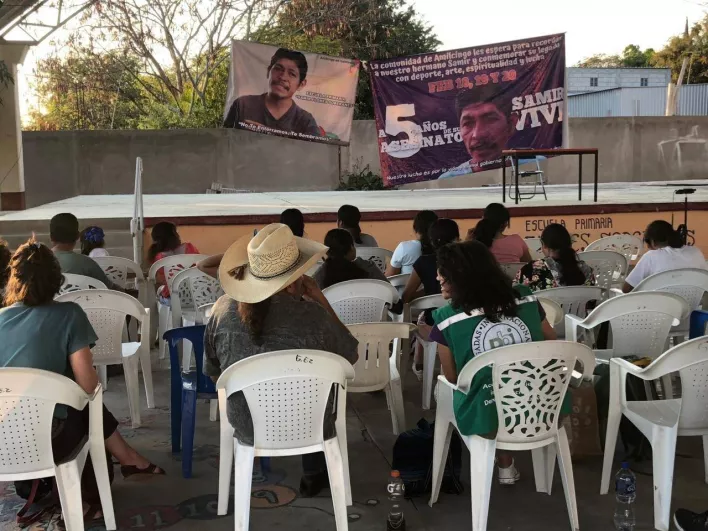Samir Flores Soberanes, quien lucha por la vida nunca muere

Foto: PBI México

Foto: PBI México
El sol del mediodía arde implacable en el pequeño patio de Santa María Mixtequilla (SMM), estado de Oaxaca, donde se encuentran reunidas unas 50 personas. Algunas mujeres intentan refrescarse con abanicos de papel, mientras los hombres llevan grandes sombreros para aliviar el calor del Istmo. Un anciano, de pie, habla con decisión mientras la multitud apoya sus palabras con imperceptibles movimientos de cabeza: “quieren pagarnos por un metro de tierra lo que vale un kilo de tortillas”.
El mes de agosto pasado, la equipa de Consorcio para el Diálogo Parlamentario y la Equidad Oaxaca (Consorcio Oaxaca) celebró 20 años de luchar y crear colectivamente a favor de la defensa de los derechos más fundamentales de todos, todas y todes.
En México, al igual que en el resto de la región y en gran parte del planeta, la lucha por los derechos de los pueblos indígenas, la tierra, el territorio y un medioambiente sano se ha convertido en una de las reivindicaciones más extendidas y, por desgracia, con mayores riesgos para las personas, organizaciones y comunidades que las llevan a cabo. Esto se debe a una multitud de factores, desde los intereses políticos y económicos que afectan hasta la falta de perspectivas comunitarias e interseccionales a la hora de garantizar su protección, seguridad y legítima labor que desempeñan.
“Frente a la desmemoria, que contribuye a la opresión y marginación, se reivindica el arma de la memoria. La memoria es fundamental en la vida de los pueblos, ya que evita que caigamos en el olvido de nosotros. A través de la memoria se le da sentido y, por lo tanto, estabilidad a la existencia humana. En la memoria la tierra es mucho más que un espacio productivo, ya que está llena de símbolos y referencias entrañables, por eso los viejos de Temoac exclaman con vehemencia ‘esta tierra costó sangre’ en referencia a la gesta zapatista ‘y por eso no se vende’.
Hoy, 29 de noviembre de 2022, el Día Internacional de las Defensoras de los Derechos Humanos, celebramos a las mujeres fuertes y valientes que forman la columna vertebral de la lucha por una vida más justa.
20 años de libre comercio entre la UE y México han implicado devastación social y ambiental en México. Más de 120 organizaciones y redes de la sociedad civil hacen públicas 6 razones para no ratificar el TLCUEM “modernizado”.
El pasado enero del presente año, Brigadas Internacionales de Paz, acompañó al Frente de Pueblos en Defensa de la Tierra y el Agua, Morelos Puebla y Tlaxcala (FPDTA-MPT), en el encuentro nacional de radios comunitarias en la defensa del Territorio y la Vida, llevado a cabo en el Valle de Tehuacán, Puebla. Allí, tuvimos la oportunidad de conocer divergentes medios alternativos de comunicación “Voces de la Resistencia” que utilizan su voz para promover la cultura, las tradiciones, la unión de las comunidades indígenas y el derecho a la libertad de expresión.
En México, la situación de las personas defensoras de derechos humanos es preocupante, algunas de ellas han sido desaparecidas como consecuencia de su participación en procesos de búsqueda y de lucha contra las desapariciones en el país. Esta fue una de las observaciones presentadas por el Comité contra la Desaparición Forzada de las Naciones Unidas (CED por sus siglas en inglés), en el informe sobre su visita a México el pasado 12 de abril de 2022.